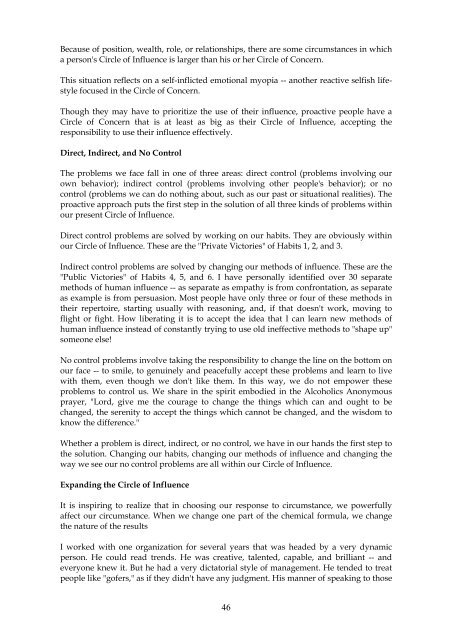Covey - The 7 habits of highly effective people
Create successful ePaper yourself
Turn your PDF publications into a flip-book with our unique Google optimized e-Paper software.
Because <strong>of</strong> position, wealth, role, or relationships, there are some circumstances in which<br />
a person's Circle <strong>of</strong> Influence is larger than his or her Circle <strong>of</strong> Concern.<br />
This situation reflects on a self-inflicted emotional myopia -- another reactive selfish lifestyle<br />
focused in the Circle <strong>of</strong> Concern.<br />
Though they may have to prioritize the use <strong>of</strong> their influence, proactive <strong>people</strong> have a<br />
Circle <strong>of</strong> Concern that is at least as big as their Circle <strong>of</strong> Influence, accepting the<br />
responsibility to use their influence <strong>effective</strong>ly.<br />
Direct, Indirect, and No Control<br />
<strong>The</strong> problems we face fall in one <strong>of</strong> three areas: direct control (problems involving our<br />
own behavior); indirect control (problems involving other <strong>people</strong>'s behavior); or no<br />
control (problems we can do nothing about, such as our past or situational realities). <strong>The</strong><br />
proactive approach puts the first step in the solution <strong>of</strong> all three kinds <strong>of</strong> problems within<br />
our present Circle <strong>of</strong> Influence.<br />
Direct control problems are solved by working on our <strong>habits</strong>. <strong>The</strong>y are obviously within<br />
our Circle <strong>of</strong> Influence. <strong>The</strong>se are the "Private Victories" <strong>of</strong> Habits 1, 2, and 3.<br />
Indirect control problems are solved by changing our methods <strong>of</strong> influence. <strong>The</strong>se are the<br />
"Public Victories" <strong>of</strong> Habits 4, 5, and 6. I have personally identified over 30 separate<br />
methods <strong>of</strong> human influence -- as separate as empathy is from confrontation, as separate<br />
as example is from persuasion. Most <strong>people</strong> have only three or four <strong>of</strong> these methods in<br />
their repertoire, starting usually with reasoning, and, if that doesn't work, moving to<br />
flight or fight. How liberating it is to accept the idea that I can learn new methods <strong>of</strong><br />
human influence instead <strong>of</strong> constantly trying to use old in<strong>effective</strong> methods to "shape up"<br />
someone else!<br />
No control problems involve taking the responsibility to change the line on the bottom on<br />
our face -- to smile, to genuinely and peacefully accept these problems and learn to live<br />
with them, even though we don't like them. In this way, we do not empower these<br />
problems to control us. We share in the spirit embodied in the Alcoholics Anonymous<br />
prayer, "Lord, give me the courage to change the things which can and ought to be<br />
changed, the serenity to accept the things which cannot be changed, and the wisdom to<br />
know the difference."<br />
Whether a problem is direct, indirect, or no control, we have in our hands the first step to<br />
the solution. Changing our <strong>habits</strong>, changing our methods <strong>of</strong> influence and changing the<br />
way we see our no control problems are all within our Circle <strong>of</strong> Influence.<br />
Expanding the Circle <strong>of</strong> Influence<br />
It is inspiring to realize that in choosing our response to circumstance, we powerfully<br />
affect our circumstance. When we change one part <strong>of</strong> the chemical formula, we change<br />
the nature <strong>of</strong> the results<br />
I worked with one organization for several years that was headed by a very dynamic<br />
person. He could read trends. He was creative, talented, capable, and brilliant -- and<br />
everyone knew it. But he had a very dictatorial style <strong>of</strong> management. He tended to treat<br />
<strong>people</strong> like "g<strong>of</strong>ers," as if they didn't have any judgment. His manner <strong>of</strong> speaking to those<br />
46


